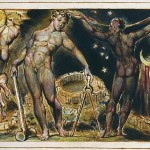I read loads of really awesome blogposts and articles in 2015. Bloggers on Patheos Pagan, Gods and Radicals, and elsewhere. The conversation is deepening. We are starting to wrestle with how we as Pagans respond to suffering, oppression, doubt, death, pain, and fear. We are starting to frame Pagan understandings of consent and community.
So it was hard to select five blogposts that were a “must-read”. The five blogposts listed here are some of the ones that really stood out for me. When I thought back over the year, these were the ones that I remembered reading and going, “wow, yes, this”. There were many other blogposts and bloggers that also made me go “wow” and “yes”. Thank you to all of them for some amazing and thought provoking reads. If you aren’t reading Niki Whiting, Crystal Blanton, T Thorn Coyle, Cat Chapin-Bishop, Annika Mongan, Laine Glaistig, Molly Khan, Alley Valkyrie, Nimue Brown, Jason Mankey, Thorn Mooney, John Beckett, Rhyd Wildermuth, Naomi Jacobs, and the articles at Gods and Radicals, you are missing a feast of great writing.
Here are five excellent and important posts that I remembered when I sat down to make a list.
Why racism is Paganism’s business – Cat Chapin-Bishop
Many Pagan bloggers have written urgently and well in support of the Black Lives Matter movement, and many Pagans, polytheists, and other people of faith have turned out to protests and shown up in solidarity. Cat has been doing this consistently, in her community, on Facebook, and on her blog. Here she gives a Pagan social and theological explanation of why we should support people of colour and challenge systemic racism and white supremacist ideology.
[Racism] it isn’t something that happens “out there”–and when Pagans of color draw it to our attention, if we white Pagans respond by minimizing what they’re saying, by calling it hand wringing or accusing Pagans of color of making too much of a fuss, we’re actually supporting the overculture’s lie that talking about racism is “divisive” or somehow the problem–that being “race blind” (which usually means white people being willfully blind to racism) is the way to support justice.
Editorial : Against Authority, Against Terror – Rhyd Wildermuth
There are so many quotable bits in this editorial, which shows the many ways in which terror and authority reinforce each other. The opening paragraph sums it up:
I don’t need to tell you what happened. You’ve seen it already, the images of carnage, the collective mourning, the shaking anger, vows for reprisals, calls for restraint. And then the near-simultaneous retaliations in multiple countries by anti-terror police, new crackdowns, increased arrests, tightened security.
Rhyd has written so much good stuff this year but this piece really stood out for me because I wanted to print it out and stick all the quotable bits on my wall and make everyone read it. I used a quote from it as a chapter heading quote in the book that I am writing.
Do We Act Justly? Disability, Mental Illness and Vulnerability – Naomi Jacobs
This piece offers a new model of disability and how society relates to disabled people. Instead of treating them as vulnerable and victims, which removes their agency and autonomy, we should be treating them equally. I think this is important because it challenges even those people who think they are being disability-friendly to challenge the assumptions on which their attempts at inclusion are based.
If you have to make special arrangements after the fact, you didn’t start by thinking about access for all. You thought of us as vulnerable people who need help, not as equal people whom you forgot about when designing your festival, or ritual, or meeting. And that’s a problem for all of us who want to live in a society where there is equity and justice for all. The social model of disability says that we are made more disabled, made vulnerable, by societies that are created for non-disabled people and that don’t want to change to include us.
Deep Polytheism: On the Agency and Sovereignty of the Gods – Morpheus Ravenna
Not exactly a blogpost, as it was actually Morpheus’ keynote address at the Many Gods West conference, but I suspect it will come to be seen as one of those defining moments in polytheist history. What gods are and how we relate to them have been key themes in the Pagan blogosphere over the last year.
Morpheus offers a metaphor for understanding the relationship between the gods, the world, and us, and how we see the gods. Among many interesting points and insights, she explains how to understand archetypes in relation to gods.
Here’s a model I’ve used to illuminate this: Imagine being inside a church, and here is a stained glass window. The window contains an image in colored glass, and that image is lit and brought to life by sunlight pouring through the window.
Here, the image in glass is the archetype – it is an image, a symbol, and as we experience it, it can be alive with light and power. But, in truth, it is not in itself alive or exerting force in the world; it is a kind of passive vessel which is being enlivened by the agency of a greater force. That force, the sun that is generating the light enlivening the image, is the Gods. The church, in this model, is the human mind.
Spiritual Buffets and the Value of Traditions – John Beckett
In this, and many other recent posts, John argues for deep engagement with the tradition you are in, instead of pick and mix spirituality that hasn’t been carefully thought through.
Doing fusion well – with food or with spirituality – requires a deep understanding of elements and themes, not just picking things at random because they look appetizing.
Without a tradition it’s hard to get started. Without a tradition it’s even harder to movev beyond the basics. If there’s nothing to tell you that crab legs are delicious, you’re not likely to ever try to eat them. They look creepy and eating them is a lot of work!
There were loads of other good posts, and I am sure other bloggers will have lists of good ones.
Best wishes to all our readers for 2016, and may we continue to deepen our conversations and strengthen our community, both online and face to face.
















